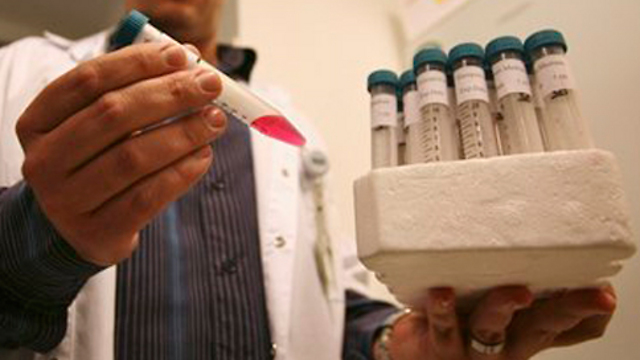Three of the women are pregnant, one of them had to undergo a Caesarean section due to her serious condition; Health Ministry calls on public to get flu shots.
The Health Ministry issued a warning on Thursday of a new outbreak of swine flu in Israel, calling on the public to get a flu shot after one woman died of the H1N1 virus and at least 11 other patients were hospitalized, seven of them in serious condition.
At least two of the women, who were all placed in quarantine, have not gotten the flu vaccination this year, which also includes a vaccine for swine flu.
Esther Aryeh, a 55-year-old mother of six from Netivot, passed away earlier this week after contracting swine flu and and fighting for her life for the past few weeks.
“Had Esther gotten vaccinated, this might not have happened,” said Esther’s husband Yehuda. “I call on everyone to get vaccinated. If the doctors say we should – then we must.”

Three pregnant women have been hospitalized the Soroka Medical Center in Be’er Sheva with flu-like symptoms in recent days, where they were diagnosed with the H1N1 virus and treated accordingly.
One of them, a 25-year-old woman, had to undergo a Caesarean section due to her serious condition. The baby was hospitalized at the NICU in stable condition. The condition of the two other pregnant women has improved.
Another woman, 57 years old, was hospitalized at the ICU in Soroka in serious condition. She has been put on a respirator.
A woman about 40 years old has been hospitalized in the ICU at the Shaare Zedek Medical Center in Jerusalem and put on a respirator.
At the Hadassah Medical Center’s Mount Scopus hospital, a 46-year-old male patient is hospitalized in light condition after arriving several days ago in moderate condition.
There are suspicions several other women caught the virus as well, including one woman in her 20s at Shaare Zedek, one woman at the Sheba Medical Center in Tel HaShomer and several at the Hadassah Medical Center in Jerusalem.
Several children who caught the virus are also hospitalized at the Sheba Medical Center, but they are not at risk.
Those vaccinated are protected
“We’ve seen several serious cases of swine flu in the past month, some were hospitalized and several got to the ICU,” said Dr. Lior Nesher, an infectious disease specialist at the Soroka Medical Center. “Among the patients are several serious cases that needed respiration and a heart-lung machine. We have serious morbidity rates, similar to what we saw in 2009.”
“We see two-three new cases a day, and the season just started several weeks ago,” Dr. Nesher added.
Prof. Nati Keller, the head of the Clinical Microbiology and Immunology Department at the Sheba Medical Center and the chairman of the Israeli Infectious Diseases Society, explained that swine flu was created by a genetic mutation of the flu virus.
He assured the public that those who received flu shots are safe from swine flu. “The flu began rearing its head about a week ago and the strains found are covered by the vaccine. Those who received the vaccine recommended by the Health Ministry are most likely protected,” he said.
Prof. Keller noted that pregnant women, the elderly, and young children are at risk groups.
Swine flu is an infection caused by viruses of the Orthomyxovirus family, including influenza A, B and C. After contagion, the virus replicates itself in the body within a week, after which symptoms appear. These include high fever, an intense headache, muscle aches, weakness and fatigue. Other symptoms like a runny nose, throat ache or a feeling of pressure in the chest area, are less common.
The first symptom of swine flu to appear is usually severe respiratory morbidity accompanied with fever. In very rare cases, which have not been documented in western countries, the virus could cause infection in additional organs in the body.
As reported by Ynetnews
